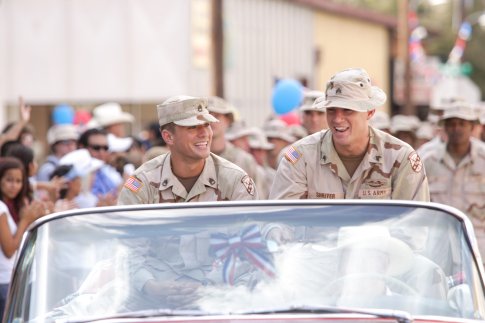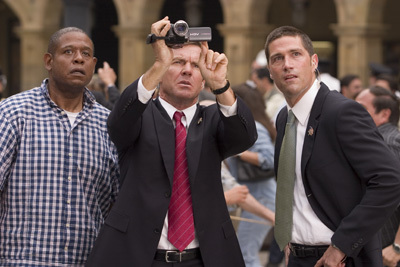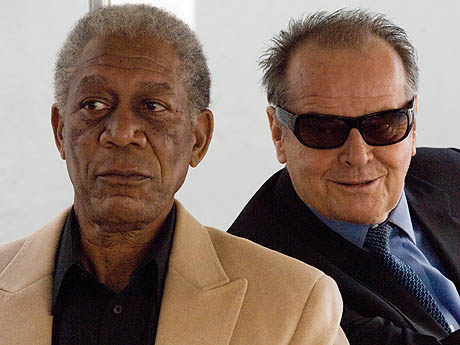Twelve jurors, hot and tired after a six-day murder trial, file into the jury room. They begin with a vote — 11 vote for a guilty verdict, but one (Henry Fonda), juror Number 8, votes to acquit. The others are impatient, and there are mutters of “there’s always one.” Number 8 says he is not convinced that the boy, accused of killing his father, is innocent, but that he believes that they owe him more than one quick vote. They should talk about it before they find him guilty, which means an automatic sentence of death.
We never hear the men’s names, but we learn a great deal about them as they deliberate. The boy admitted arguing with his father. He admitted buying a switchblade with a distinctive handle, exactly like the one the man was stabbed with. One witness says she saw the boy stab his father with the knife, in the brief moment when an El train sped by the window. Another witness says he heard a body fall to the floor and then saw the boy run out of the apartment. But the boy says that he wasn’t there, that he went to a movie, though on that night he could not remember the name of the movie or any of the details. He said the knife must have fallen out of his pocket.
After an hour, Number 8 says that they should vote again, and if the 11 are still in favor of a guilty verdict, he will vote with them. But another juror changes his vote, and they continue to debate. They examine each piece of evidence, each word of testimony carefully. And they examine themselves, uncovering prejudices and blind spots that interfere with their ability to be impartial. One by one, each finds a flaw in the evidence to persuade him of the boy’s innocence.
The men are impatient to come to a conclusion not just because they are hot and tired, but also because they are uncomfortable sentencing a boy to death. They want it to be easy and clearcut, and they want it to be quick, so they do not have to think too hard about what they are doing. Juror 8’s most difficult challenge is to get each of them to think independently and objectively about the evidence. One of the last jurors to change his mind is the ultra-logical Number 4 (E.G. Marshall). When a new fact is introduced that calls the logic of his calculations into question, he is willing to change his vote. But for most of the others, the issue is emotional as well as logical. Families should try to identify the way that each juror brings his background, personal or professional, into the deliberations. In some cases, that background provides insight that was helpful, as when Number 5 (Jack Klugman) spoke of his experiences growing up in a slum. In others, the background was an obstacle that had to be overcome, as in the bigotry of Juror Number 10 (Ed Begley) or the displaced anger of Juror Number 3 (Lee J. Cobb).
Notice in particular the way that Number 8 listens to everyone else, even when it does not relate to the case, as when the foreman tells him about the time his big game was rained out. Compare that to the energy Number 3 devotes to refusing to listen, and to Number 7’s (Jack Warden) constant efforts to deflect or push away any engagement, intellectual or emotional, with wisecracks. Number 7’s use of humor is in sharp contrast to some of the others, like Number 11, who use humor to make a point, to take the discussion further, as in the comment about the use of proper English. This is also an outstanding example of different approaches to problem-solving, an especially important subject for family discussion.
Family discussion:
• What would have happened if Juror 8 had not been on the jury?
• Why didn’t they use their names during the deliberation (or in the credits), and why did two of them introduce themselves before they left the courthouse?
• Why do you think Number 3’s son won’t see him? How did that affect his judgement?
• Why do we have juries, instead of just letting the judge decide every case? Why do we have 12, and not fewer or more?
• Does this movie make you feel better or worse about the jury system? How will it affect you when you serve on a jury?
Connections: This film includes outstanding character actors Martin Balsam, Ed Begley (both Oscar-winners for other performances), E. G. Marshall (from television’s “The Defenders”), Jack Klugman (from televison’s “The Odd Couple” and “Quincy”), and Jack Warden (Harry Rosenfeld in “All the President’s Men”). One of the best books ever written about filmmaking is Sidney Lumet’s Making Movies , which includes a fascinating explanation of the making of this, his first feature film. Watch the way that he uses camera angles to create different impressions within the confines of the one-room set.
, which includes a fascinating explanation of the making of this, his first feature film. Watch the way that he uses camera angles to create different impressions within the confines of the one-room set.
Activities: Talk to the kids about your own service on a jury, or, if you have not had the chance to serve, see if someone else they know can tell them what it was like. Take them to sit in on a trial, or pick one suitable for them to watch a bit of on Court TV. Ask them how they would handle serving on a jury deciding the outcome of a case currently in the news.
and Anatomy of a Murder
. I even wrote a law review article about two of my favorites, Miracle on 34th Street and Inherit the Wind
.

 A young soldier who has come home from Iraq is forced to rethink his ideas about heroism and patriotism when he is “stop-lossed” — informed that instead of leaving the Army he has been involuntarily assigned to another tour of duty. Brandon (Ryan Phillippe) and Steve (Channing Tatum), his best friend since high school, were greeted with an old-fashioned hero’s welcome right out of a Norman Rockwell painting, with a parade and a warm handshake from their Senator, who says his door will always be open to real-life American heroes. They speak proudly about “killing ’em in Iraq so we won’t have to kill ’em in Texas.” But when Brandon finds out that the government has the right to send him back, he goes AWOL and leaves for Washington with Steve’s estranged fiancée (Abbie Cornish), hoping the Senator will find a way for him to stay home.
A young soldier who has come home from Iraq is forced to rethink his ideas about heroism and patriotism when he is “stop-lossed” — informed that instead of leaving the Army he has been involuntarily assigned to another tour of duty. Brandon (Ryan Phillippe) and Steve (Channing Tatum), his best friend since high school, were greeted with an old-fashioned hero’s welcome right out of a Norman Rockwell painting, with a parade and a warm handshake from their Senator, who says his door will always be open to real-life American heroes. They speak proudly about “killing ’em in Iraq so we won’t have to kill ’em in Texas.” But when Brandon finds out that the government has the right to send him back, he goes AWOL and leaves for Washington with Steve’s estranged fiancée (Abbie Cornish), hoping the Senator will find a way for him to stay home. A gimmicky thriller without much of a gimmick or many thrills, “Vantage Point” suffers, too, from being out of synch with its time. Its premise may be current — an assassination attempt at an anti-terrorism summit — but its tone is off. A good thriller — or even a good episode of “Law and Order” — uncovers our underlying fears, recognizes that they are closely tied to curiosity, and pushes them to the point of pleasurable fear and cathartic release. This film clumsily builds on the headlines with a simplistic story that, even told in mosaic bits and pieces is obvious and clunky, with big logical gaps. It would be more intriguing to see the same story told several times from different perspectives, each one adding another layer of information, if the underlying story was worthwhile. But this story of a terrorist attack at an anti-terrorism summit, is too thin to withstand the repetition. Instead of making it deeper and more complex, the retellings get tiresome and overblown.
A gimmicky thriller without much of a gimmick or many thrills, “Vantage Point” suffers, too, from being out of synch with its time. Its premise may be current — an assassination attempt at an anti-terrorism summit — but its tone is off. A good thriller — or even a good episode of “Law and Order” — uncovers our underlying fears, recognizes that they are closely tied to curiosity, and pushes them to the point of pleasurable fear and cathartic release. This film clumsily builds on the headlines with a simplistic story that, even told in mosaic bits and pieces is obvious and clunky, with big logical gaps. It would be more intriguing to see the same story told several times from different perspectives, each one adding another layer of information, if the underlying story was worthwhile. But this story of a terrorist attack at an anti-terrorism summit, is too thin to withstand the repetition. Instead of making it deeper and more complex, the retellings get tiresome and overblown.